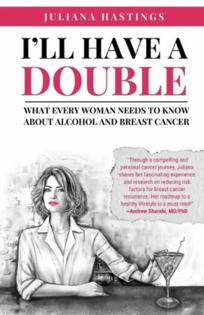A surprising eye-opener on the fight against breast cancer
Published in Mom's Advice
The purpose of Juliana Hastings’ book, "I’ll Have a Double: What Every Woman Needs to Know About Alcohol and Breast Cancer" is to raise awareness and share what she has learned during her own breast cancer journey.
While this book is a memoir of Juliana’s experience, it is also a guide for patients. She offers a wide array of helpful tips and each chapter ends with "Chapter Learnings." It’s easy to look back later at certain sections as you go through your own journey. She provides important life information. While it can be overwhelming, Juliana lays it all out so clearly and with such empathy.
With over 4 million breast cancer patients, survivors and fighters, many are unaware that alcohol is linked to breast cancer in much the same way smoking is linked to lung cancer. She not only highlights this connection but also delves into the diet and lifestyle changes that can help reduce risks.
Do we have any idea what we put in our bodies is doing to our bodies? And how our behavior increases our cancer risk? There are other villains too, like sugar, processed foods, lack of exercise, stress, poor sleep habits, and inflammation.
A couple of years ago, I had a cancer scare. Something was found and I was told it could be “nothing” or “something REALLY bad.” It was a scary few weeks before it was determined that it wasn’t cancer. What a relief when I found out I didn’t have it — at least THEN.
The scary fact is that 1 in 8 women in the U.S. will get breast cancer (12.5%). Having one alcoholic beverage a day ups that probability to 15% and two increases it to 17.5%. Then adding in other risk factors like dense breasts, not having children, and a bad diet and your chances increase even more. But what if you could actually do something to reduce your chances of getting cancer… wouldn’t you want to do it? What about keeping it from recurring once you’ve had it?
How healthy is YOUR lifestyle? Juliana never thought that she could be a statistic… one of the ‘one in eight.’
Julie writes, “I was in good health, maintained a normal weight, ran 40-50 miles a week, did weight training, enjoyed a fulfilling career, and was blessed with a loving husband and a circle of wonderful friends.” She was generally fit, healthy and ate well — or so she believed.
We go on this journey with Juliana from the very beginning — all her thoughts and fears, her attempts to calm herself, her online research and difficult decisions. You feel like you are in the exam room with her (even though her husband wasn’t even allowed to be there since this was right in the middle of COVID protocols). You feel alongside her that feeling of the unknown and the fact that your life is possibly about to change drastically.
Acknowledging that this cancer journey affects the patient’s partner as well, there is even a chapter written by her husband, Hunter. He provides a strong support system and they set out together on a health journey to try to prevent the chance of recurrence. The key they say is to find a lifestyle that is sustainable and enjoyable.
As Hunter says, “the prospect of living with cancer introduced a feeling of an internal, concealed threat, an entity hidden but not dormant — an unseen presence … so we had to actively address the lurking … If cancer were to recur, it wouldn’t be due to any failure on our part to face up to reality or adapt to new information.”
Juliana and Hunter talk about having a favorite book in common: "The Theory of Moral Sentiments" by Adam Smith. In it, Smith ponders how we can live a better life. He talks about “seeing oneself.”
“First, The Impartial Spectator, think your conscience, and second, the mysterious veil of self-delusion… as we seek to live a better, healthier post-cancer treatment life, our ‘Impartial Spectator’ forever perched on our shoulders is there to guide our actions and decisions: to pop that cork or not, consume sugar, preservatives, and processed foods or not, exercise or not. At the same time, the ‘mysterious veil of self-delusion’ is in constant search of excuses — just one drink, one cookie won’t hurt, everyone else is indulging, I’ll exercise tomorrow, I am on vacation, house guests, etc. Our Impartial Spectator wants us to live and is at constant odds with our mysterious veil of self-delusion. Embrace your Impartial Spectator and her fight for your life and beware of self-delusion. It’s really not that mysterious!”
My point of view is that every woman should read this book… for herself… for her daughter… for her friends.










Comments